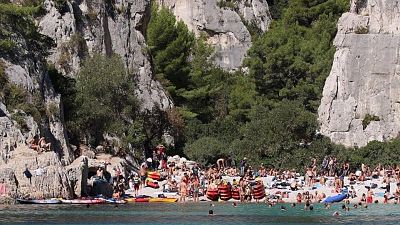From Venice to Marseilles, here’s how European travel hotspots are tackling overtourism

Marseille is introducing tough new restrictions to help save its beautiful coast from overtourism.
The French destination is the latest European travel hotspot struggling to cope with a high number of visitors.
The region is known for its stunning ‘calanques,’ cliff-lined coastal inlets sheltering tiny, azure coves.
But this rugged landscape is under threat, as the traffic of thousands of tourists erodes coastal soil and threatens native vegetation.
To limit the damage, the national park is introducing a permit system. It’s just one in a series of innovative solutions being introduced by over-subscribed European destinations as travel picks up this summer.
From cruise-ship taxes to number plate systems, here’s how Europe’s travel hotspots are coping with overtourism.
Marseille introduces a permit system
From the end of June to the end of August, visitors will have to apply online for a permit to access the popular Sugiton calanque and its beach.
Numbers will be capped at 400 people per day. Visitors can make reservations up to three days in advance via an online QR code system. Bookings will close at 6pm the night before a visit.
Reservations are free, but will be checked by a private security company at the site. One person can book up to eight times over the summer season.
“We’ve also marked areas to allow the regeneration of nature where the public is not allowed to enter,” says Zacharie Bruyas, head of communication for the Parc national des Calanques.
“We have put a reservation system in place, to ensure that the development measures are respected.”
Amalfi coast number plate rules
Italy’s Amalfi coast is known for its turquoise coves and lofty cliffs – but also for its dangerously narrow roads and hours-long traffic queues.
A new alternate number plate restriction system hopes to change this.
During peak hours in peak season, drivers on the famous 35 kilometre stretch between Vietri sul Mare and Positano will have limited access.
If your car’s number plate ends in an odd number, you will be able to access the road on odd number days. If your number plate ends in an even number, you will be able to access the road on even number days.
This new regulation will apply from 10am to 6pm on weekends from mid-June through to the end of September 2022 as well as during the Easter Holy Week holiday. Public buses, and taxis are exempt, as are residents of the 13 towns on the stretch of road.
Spain bans excessive alcohol and football shirts
Some hotspots don’t necessarily have a problem with the number of visitors they receive – but with the way that these visitors behave.
Earlier this month, one of Majorca’s most popular party districts – Playa de Palma – banned people wearing football shirts from entering restaurants. It was part of a wider dress code designed to discourage drunken bad behaviour.
This new restriction compliments existing rules that limit so called ‘excess tourism.’ Resorts in Magaluf, Playa de Palma and San Antonio in Ibiza have banned all-you-can-drink deals, bar crawls and happy hours among other measures to curb excessive alcohol consumption.
Venice bans cruise ships
Venice has long suffered from a surplus of tourists. In peak season, the city of just 50,000 residents can receive up to 150,000 tourists per day.
Last year, large cruise ships were banned from docking in its port. From 2023, day-trippers will also have to pay an entry fee of up to €10 per day. This fee was due to start in June, but has now be postponed until 2023.
Overnight visitors already pay a tourism tax of €5 per night, which is included in their hotel bills.
Barcelona proposes a tax on cruises
Visitors to Barcelona are already charged a tourist levy, coughing up €3 for a stay of more than 12 hours and €1 for a stay of less than 12 hours. These costs – along with an existing €1.75 surcharge – are usually included in the price of booking cruises or hotels.
But cruise tourism is a particularly big problem for the city as Europe’s busiest cruise port. In 2019, roughly 3 million passengers disembarked in the city, with daily cruise visitor numbers exceeding 10,000 for 139 days in the year.
As traffic resumes post-COVID, authorities announced a cruise-specific tax to help curb the pollution that these giant ships bring.
The government will outline details of the new tax “in the coming weeks,” said Catalonian minister for climate action, Teresa Jordà.
